山西省怀仁县巨子学校高中部外研版高中英语必修五《Module 1 British and American English Listening》课件(共21张PPT)
文档属性
| 名称 | 山西省怀仁县巨子学校高中部外研版高中英语必修五《Module 1 British and American English Listening》课件(共21张PPT) |  | |
| 格式 | zip | ||
| 文件大小 | 5.7MB | ||
| 资源类型 | 教案 | ||
| 版本资源 | 外研版 | ||
| 科目 | 英语 | ||
| 更新时间 | 2015-10-11 18:12:12 | ||
图片预览

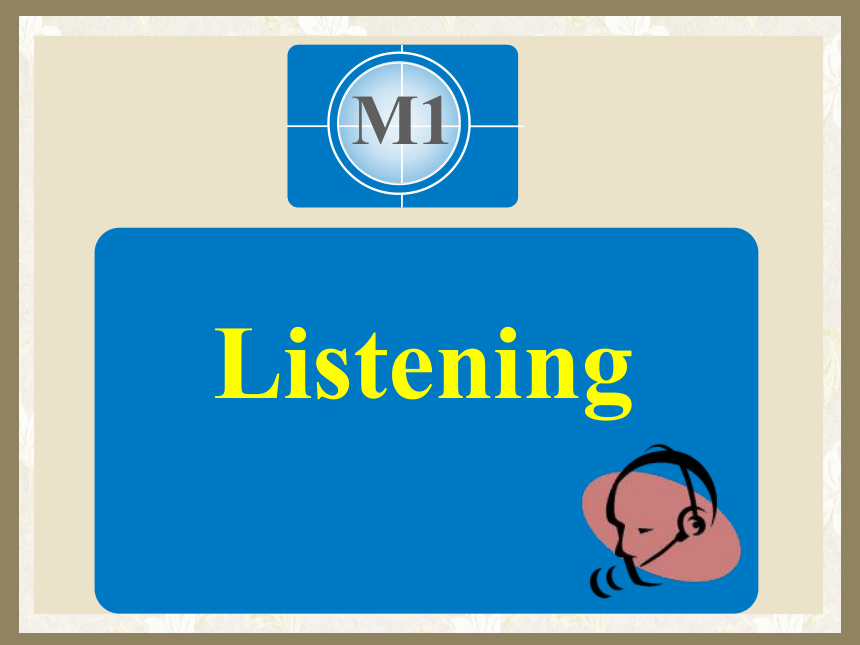
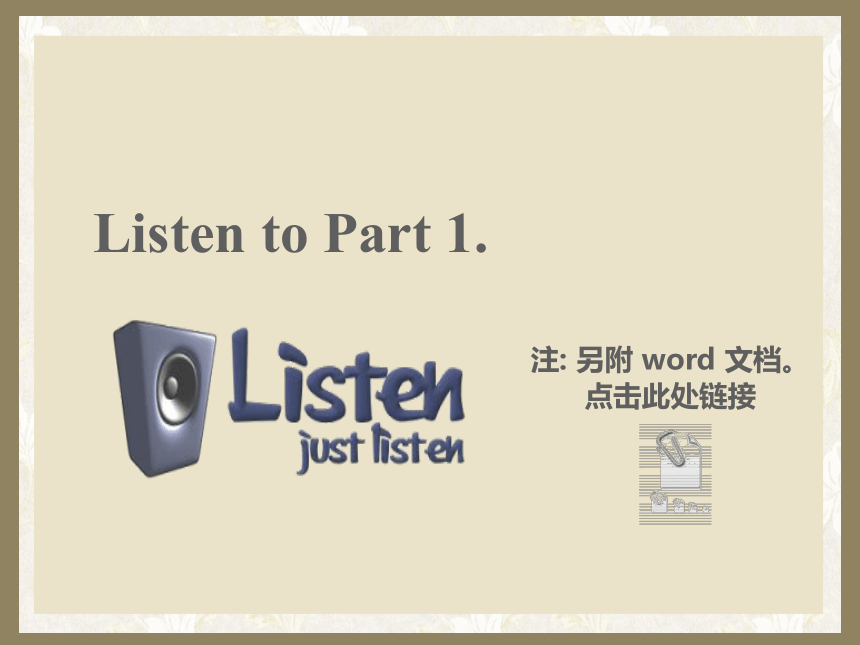
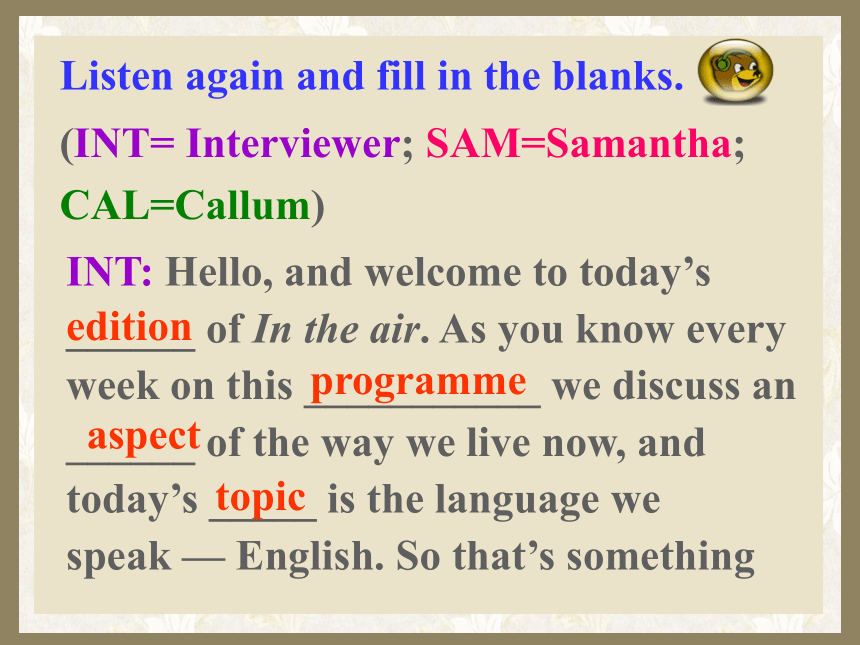

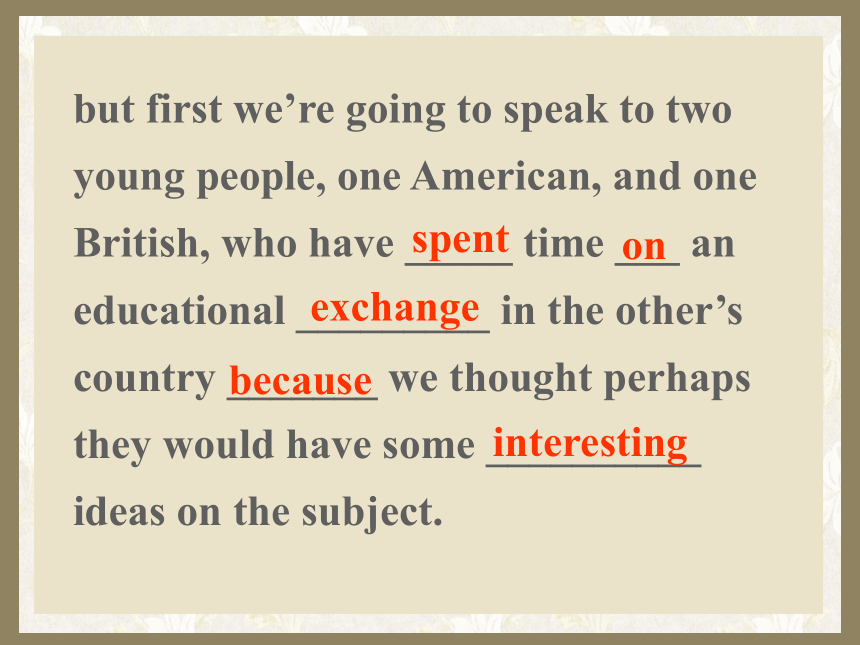
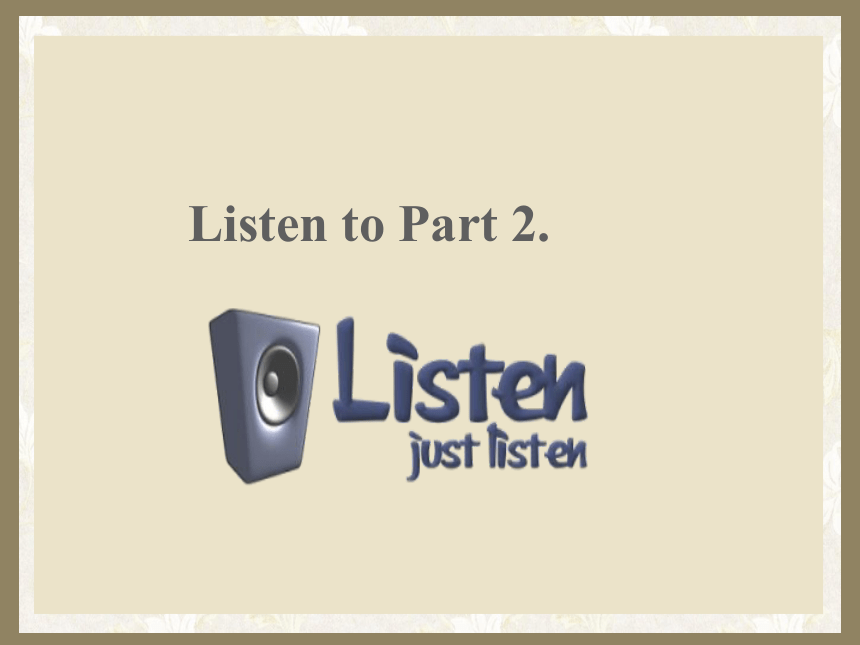
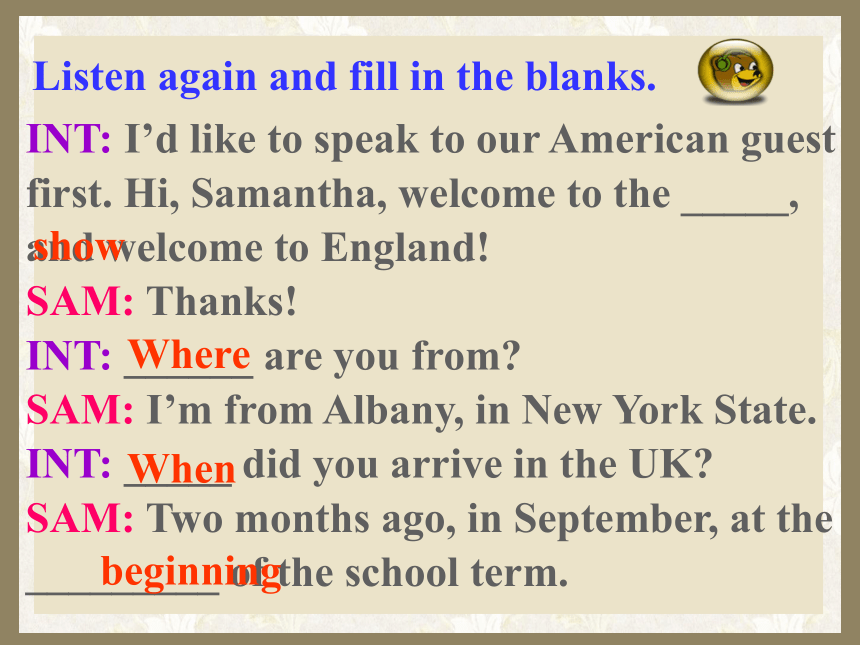
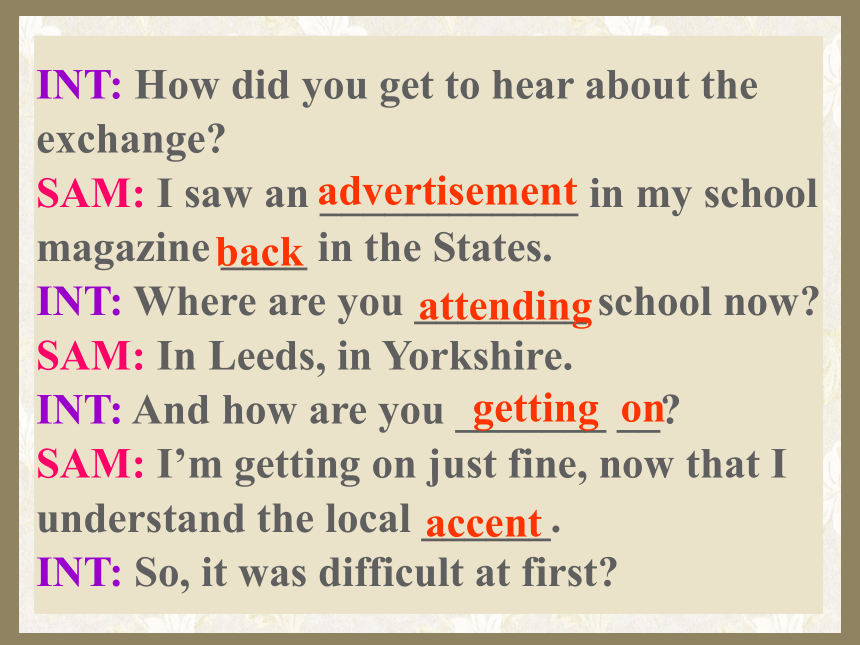
文档简介
课件21张PPT。外研新标准
第五册 必修5M1ListeningListen to Part 1.注: 另附 word 文档。
点击此处链接INT: Hello, and welcome to today’s ______ of In the air. As you know every week on this ___________ we discuss an ______ of the way we live now, and today’s _____ is the language we speak — English. So that’s somethingeditionprogrammeaspecttopicListen again and fill in the blanks.(INT= Interviewer; SAM=Samantha;
CAL=Callum)which ______ us all. The question is, what’s going to happen to the way we speak English in the ______? Are we all going to speak like Americans? Or will British English still _____? Later on we’re going to ask you to ______ in and give your views on the _______, affectsfutureexistphonesubjectbut first we’re going to speak to two young people, one American, and one British, who have _____ time ___ an educational _________ in the other’s country _______ we thought perhaps they would have some __________ ideas on the subject. spentonexchangebecauseinterestingListen to Part 2.INT: I’d like to speak to our American guest first. Hi, Samantha, welcome to the _____, and welcome to England!
SAM: Thanks!
INT: ______ are you from?
SAM: I’m from Albany, in New York State.
INT: _____ did you arrive in the UK?
SAM: Two months ago, in September, at the _________ of the school term.Listen again and fill in the blanks.showbeginningWhereWhenINT: How did you get to hear about the exchange?
SAM: I saw an ____________ in my school magazine ____ in the States.
INT: Where are you ________ school now?
SAM: In Leeds, in Yorkshire.
INT: And how are you _______ __?
SAM: I’m getting on just fine, now that I understand the local ______.
INT: So, it was difficult at first?advertisementbackattendinggetting onaccentSAM: Yes, because I didn’t ___ what people were saying for ___ _____ ___ days.
I think that was the biggest problem I had when I _______.
INT: But then you ____ ____ ___ it?
SAM: Yes - and now it seems quite _______. In fact, in some ways the accent here, in the north of England, ________ me of American English. geta couple ofarrivedgot used tonormalremindsINT: How do you mean? ?
SAM: Well, like they say bath _______ __ bath, or Do you want to dance instead of dance, like they do in other parts of Britain.
INT: What’s been the most _______ thing about the exchange ___ ___?
SAM: _________ the people, especially the other students in my class. They’re really friendly.instead ofpositiveso farDefinitelyINT: Is there ________ ____ you like about living in Britain?
SAM: Lots of things, like the music scene in Leeds, ____ ________. I like Leeds because there’s more going on here than back home in the States. The school has a _______ music laboratory, which is really interesting. anything elsecreativefor instanceINT: I’ve got a question to ask you, Samantha, about the ______ of English. Do you think in the future everyone will speak American English?
SAM: No, why should they? Since English is spoken all over the world, I guess it’s only _______ that there are lots of ________.
INT: So do you think you’ll go home ________ with a north of England accent?
SAM: Oh no, I didn’t mean that!futurenaturalvarietiesspeakingListen to Part 3.INT: Well now I’d like to _____ __ our other guest, another exchange student, that’s ________________ Callum Nightingale. Callum, you recently returned from the US. How long were you there?
CAL: Ten months _________.
INT: And where were you?
CAL: I was in a ______ agricultural region, in a _____ small town in Mississippi. turn toaltogetherfertilefairlyListen again and fill in the blanks.eighteen-year-oldINT: That’s quite a long way _____, isn’t it?
CAL: Yes, it is.
INT: What was the most difficult problem you had?
CAL: I _______ it was the _______; it was hot and humid for a lot of the time.
INT: How did you ___ __ ____ American English?
CAL: Well, I didn’t really have any problems with the accent. It was easy to understand, they speak ______ _______. southreckonclimateget on withrather slowlyINT: But did they understand you?
CAL: That’s a good _____. I think they did. As I was the only British person in the school they _____ __ ____ of me. The girls all said my accent was ____.
INT: What was the best moment of your stay?
CAL: I think it was the ______, that’s the school dance at the end of the year. pointmade a fusscutepromINT: I want to ask you a couple of questions about American English. Did you find that a lot of words are ________?
CAL: Yes, especially __ ______ - they have grades, we have years, then the names of subjects are __ __ different, like “civics”, which basically means ____ and __________. And some sports are different - football means American football, not ______ - I actually played in the soccer team. a bitlawgovernmentsoccerdifferentat schoolThen the American word for maths is _____, without the “s” - that seems like a very small detail. But the first time I heard it, it sounded ______ ... but you get used to it. When I came home my mum said I had ______ ____ an American accent, but it’s _____ ___ now I think.
INT: Callum, do you think that in the future everybody will speak an American ______ of English? mathstrangepicked upworn offvarietyCAL: Maybe yes. I think the British will speak American English because they ____ it every day now, on ____, in _____ and so on.
INT: And are you ______ about that?
CAL: I don’t know. I _______ I don’t mind, really. Everything changes ______ ___ ____.hearhappysupposesooner or laterTVfilmsThank you.
第五册 必修5M1ListeningListen to Part 1.注: 另附 word 文档。
点击此处链接INT: Hello, and welcome to today’s ______ of In the air. As you know every week on this ___________ we discuss an ______ of the way we live now, and today’s _____ is the language we speak — English. So that’s somethingeditionprogrammeaspecttopicListen again and fill in the blanks.(INT= Interviewer; SAM=Samantha;
CAL=Callum)which ______ us all. The question is, what’s going to happen to the way we speak English in the ______? Are we all going to speak like Americans? Or will British English still _____? Later on we’re going to ask you to ______ in and give your views on the _______, affectsfutureexistphonesubjectbut first we’re going to speak to two young people, one American, and one British, who have _____ time ___ an educational _________ in the other’s country _______ we thought perhaps they would have some __________ ideas on the subject. spentonexchangebecauseinterestingListen to Part 2.INT: I’d like to speak to our American guest first. Hi, Samantha, welcome to the _____, and welcome to England!
SAM: Thanks!
INT: ______ are you from?
SAM: I’m from Albany, in New York State.
INT: _____ did you arrive in the UK?
SAM: Two months ago, in September, at the _________ of the school term.Listen again and fill in the blanks.showbeginningWhereWhenINT: How did you get to hear about the exchange?
SAM: I saw an ____________ in my school magazine ____ in the States.
INT: Where are you ________ school now?
SAM: In Leeds, in Yorkshire.
INT: And how are you _______ __?
SAM: I’m getting on just fine, now that I understand the local ______.
INT: So, it was difficult at first?advertisementbackattendinggetting onaccentSAM: Yes, because I didn’t ___ what people were saying for ___ _____ ___ days.
I think that was the biggest problem I had when I _______.
INT: But then you ____ ____ ___ it?
SAM: Yes - and now it seems quite _______. In fact, in some ways the accent here, in the north of England, ________ me of American English. geta couple ofarrivedgot used tonormalremindsINT: How do you mean? ?
SAM: Well, like they say bath _______ __ bath, or Do you want to dance instead of dance, like they do in other parts of Britain.
INT: What’s been the most _______ thing about the exchange ___ ___?
SAM: _________ the people, especially the other students in my class. They’re really friendly.instead ofpositiveso farDefinitelyINT: Is there ________ ____ you like about living in Britain?
SAM: Lots of things, like the music scene in Leeds, ____ ________. I like Leeds because there’s more going on here than back home in the States. The school has a _______ music laboratory, which is really interesting. anything elsecreativefor instanceINT: I’ve got a question to ask you, Samantha, about the ______ of English. Do you think in the future everyone will speak American English?
SAM: No, why should they? Since English is spoken all over the world, I guess it’s only _______ that there are lots of ________.
INT: So do you think you’ll go home ________ with a north of England accent?
SAM: Oh no, I didn’t mean that!futurenaturalvarietiesspeakingListen to Part 3.INT: Well now I’d like to _____ __ our other guest, another exchange student, that’s ________________ Callum Nightingale. Callum, you recently returned from the US. How long were you there?
CAL: Ten months _________.
INT: And where were you?
CAL: I was in a ______ agricultural region, in a _____ small town in Mississippi. turn toaltogetherfertilefairlyListen again and fill in the blanks.eighteen-year-oldINT: That’s quite a long way _____, isn’t it?
CAL: Yes, it is.
INT: What was the most difficult problem you had?
CAL: I _______ it was the _______; it was hot and humid for a lot of the time.
INT: How did you ___ __ ____ American English?
CAL: Well, I didn’t really have any problems with the accent. It was easy to understand, they speak ______ _______. southreckonclimateget on withrather slowlyINT: But did they understand you?
CAL: That’s a good _____. I think they did. As I was the only British person in the school they _____ __ ____ of me. The girls all said my accent was ____.
INT: What was the best moment of your stay?
CAL: I think it was the ______, that’s the school dance at the end of the year. pointmade a fusscutepromINT: I want to ask you a couple of questions about American English. Did you find that a lot of words are ________?
CAL: Yes, especially __ ______ - they have grades, we have years, then the names of subjects are __ __ different, like “civics”, which basically means ____ and __________. And some sports are different - football means American football, not ______ - I actually played in the soccer team. a bitlawgovernmentsoccerdifferentat schoolThen the American word for maths is _____, without the “s” - that seems like a very small detail. But the first time I heard it, it sounded ______ ... but you get used to it. When I came home my mum said I had ______ ____ an American accent, but it’s _____ ___ now I think.
INT: Callum, do you think that in the future everybody will speak an American ______ of English? mathstrangepicked upworn offvarietyCAL: Maybe yes. I think the British will speak American English because they ____ it every day now, on ____, in _____ and so on.
INT: And are you ______ about that?
CAL: I don’t know. I _______ I don’t mind, really. Everything changes ______ ___ ____.hearhappysupposesooner or laterTVfilmsThank you.
